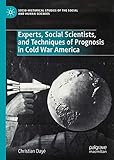Experts, Social Scientists, and Techniques of Prognosis in Cold War America [electronic resource] / by Christian Dayé.
Material type: TextSeries: Socio-Historical Studies of the Social and Human SciencesPublisher: Cham : Springer International Publishing : Imprint: Palgrave Macmillan, 2020Edition: 1st ed. 2020Description: XVI, 246 p. 12 illus. online resourceContent type: text Media type: computer Carrier type: online resourceISBN: 9783030327811Subject(s): Sociology | Historical sociology | Political sociology | Intellectual life—History | United States—History | Knowledge - Discourse | Historical Sociology | Political Sociology | Intellectual Studies | US HistoryAdditional physical formats: Printed edition:: No title; Printed edition:: No title; Printed edition:: No titleDDC classification: 306.42 LOC classification: HM24-37Online resources: Click here to access online
TextSeries: Socio-Historical Studies of the Social and Human SciencesPublisher: Cham : Springer International Publishing : Imprint: Palgrave Macmillan, 2020Edition: 1st ed. 2020Description: XVI, 246 p. 12 illus. online resourceContent type: text Media type: computer Carrier type: online resourceISBN: 9783030327811Subject(s): Sociology | Historical sociology | Political sociology | Intellectual life—History | United States—History | Knowledge - Discourse | Historical Sociology | Political Sociology | Intellectual Studies | US HistoryAdditional physical formats: Printed edition:: No title; Printed edition:: No title; Printed edition:: No titleDDC classification: 306.42 LOC classification: HM24-37Online resources: Click here to access online 1. Introduction: A Culture of Insecurity and its Experts -- 2. Experts, Think Tanks, and the Delicate Balance of Public Trust. - 3. The Wisdom of the Group: RAND's First Experiments with Expert Prediction, 1947-1951 -- 4. Negotiating Rules for the Game: Political Games at RAND, 1954-1956 -- 5. The Oracle's Epistemology: Expert Opinions as Scientific Material -- 6.The Boredom of the Crowd: The Long-Range Forecasting Delphi, 1963-1964 -- 7. Conclusion: The Strength of Epistemic Hopes. .
This book describes how Cold War researchers used expert opinions to construct foreknowledge of geopolitical relevance. Focusing on the RAND Corporation, an American think tank with close relations to the armed forces, Dayé analyses the development of two techniques of prognosis, the Delphi technique and Political Gaming. Based on archival research and interviews, the chapters explore the history of this series of experiments to understand how contemporary social scientists conceived of one of the core categories of the Cold War, the expert, and uncover the systematic use of expert opinions to craft prognoses. This consideration of the expert’s role in Cold War society and what that can tell us about the role of the expert today will be of interest to students and scholars across the history of science, the sociology of knowledge, future studies, the history of the Cold War, social science methodology, and social policy. .
